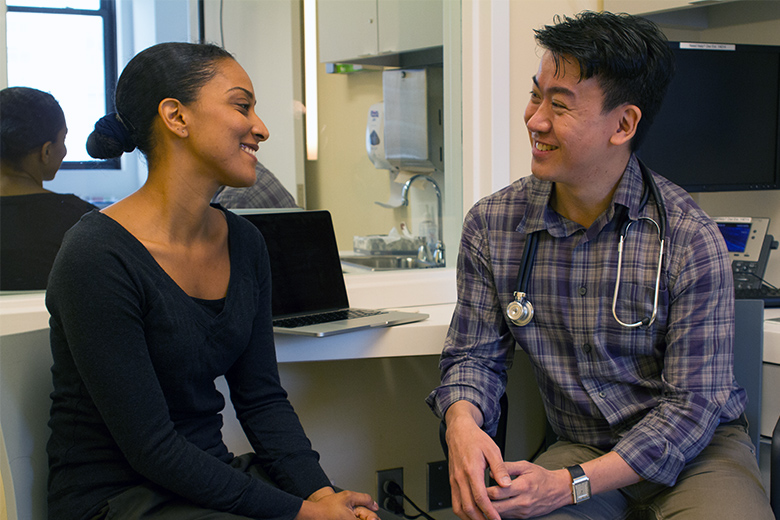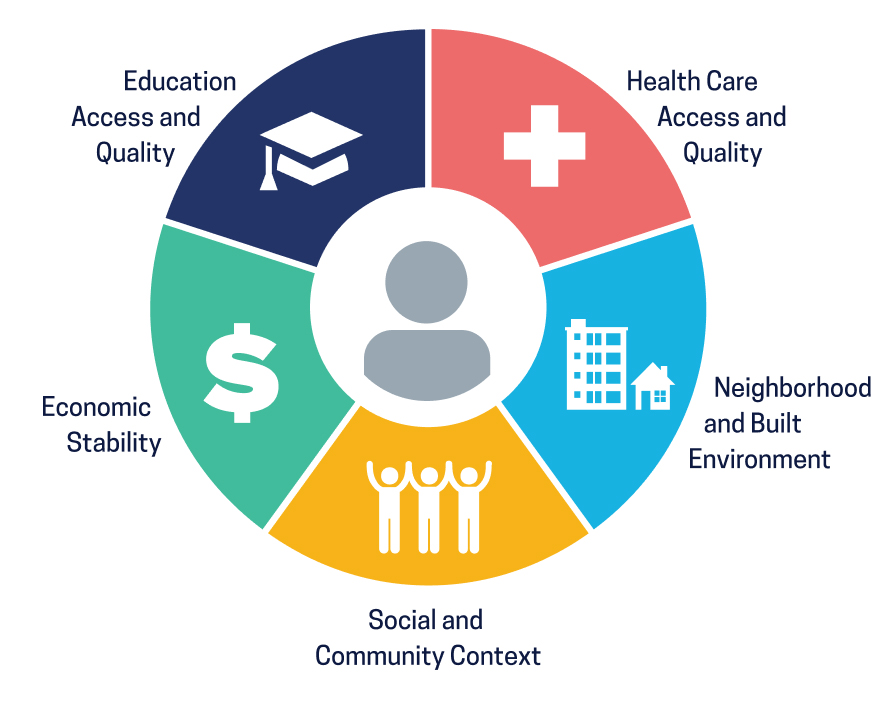


Aquifer Social Determinants of Health provides foundational knowledge and a framework for building skills that minimize the effects of social determinants of health (SDOH) on health outcomes.
Overview
Aquifer Social Determinants of Health builds a foundational understanding of social determinants of health and teaches evidence-based strategies to help improve health outcomes and equity for patients. By exploring SDOH in the context of a virtual patient case, learners have the opportunity to work through a realistic patient interaction, reflecting on their own implicit biases and cultural awareness and developing communication and clinical skills that identify underlying issues and provide patient-centered care.
Aquifer Social Determinants of Health is part of Aquifer’s Clinical Excellence Case Set, which includes 52 cases covering Palliative Care, Trauma Informed Care, Diagnostic Excellence, High Value Care, Social Determinants of Health, and Telemedine.
What are Social Determinants of Health?
Social determinants of health are the conditions in which people are born, grow, live, work, and age. These circumstances are shaped by the distribution of money, power, and resources at global, national, and local levels. Social determinants of health are a significant cause of health inequities – avoidable and unjust differences in health status seen within and between populations.
- Part of Aquifer’s Clinical Excellence Case Set, included with Curricular Partner subscriptions and available by subscription to Limited Subscribers
- Case content focused on learning fundamental communication skills and systems knowledge key to providing care that maximizes health equity
- A combination of cases, readings, and tools to help students translate skills to clinical practice
- Ready-made cases to support self-directed learning, appropriate to supplement pre-clinical or clinical learning
- Cases take approximately 15-20 minutes to complete.
- Appropriate to support pre-clinical or clinical learning.
- Can be combined with other cases in a custom course to meet the needs of your specific curriculum.
The overview and resources module provides key foundational learning on SDOH, with definitions, developing an understanding of how cultural beliefs and community culture affect health outcomes, and strategies for improving clinician-patient interactions.
The two virtual patient cases provide an opportunity for students to learn in the context of a realistic patient scenario, working to develop their own cultural awareness, interpersonal skills, and professionalism. Learners are able to practice the application of the information in a safe space, working through patient and family interactions, and practicing using the tools when caring for a patient.
While the patients are children in these cases, the learning objectives are applicable to patients of all ages.
All Clinical Excellence Case Sets, including Social Determinants of Health, now include:
- Principles module: covers key definitions, epidemiology, explanations of key principles and why they are important for patient care, and a harm statement that makes it explicit what harm can come to the patient if the principle is not incorporated into practice.
- Application Cases: Brief, realistic case scenarios that focus on one area of a patient encounter, and are centered around asking students to make important clinical decisions. Content models evidence-based best practices and communication strategies, exploring the real-world impacts on care and potential harm. At the end of each case, a reflection question asks the students to consider key takeaways, implications for their future practice, or personal wellness. Each application case also includes self-assessment questions that extend the learning to other scenarios.
Aquifer Social Determinants of Health is designed for any level student in a medical school or health professions program. The course is an ideal assignment for students to complete as preparation for clinical experiences that include telemedicine. Cases also serve as valuable reference material for students to return to as they need to refresh their knowledge during clinical rotations.
Programs with a current Aquifer subscription will also have faculty and administrator access to an accompanying educator guide. Subscribers will also be able to view student progress reporting and combine the new cases with other Aquifer content in a custom course.
- Case 1: Principles of social determinants of health
- Case 2: 2-year-old with fever and headache
- Case 3: 2-year-old with pneumonia and probable empyema
Learn More
3 Minute Video
Learn how Aquifer Social Determinants of Health—available free of charge—can benefit students and faculty in your program from Aquifer’s Chief Academic Officer Sherilyn Smith, MD.
Listen to the Aquifer Educator Connection Podcast with Regina Welkie, MSPAS, PA-C and Emily McSparin, MPA, PA-C, of DeSales Univeristy Physician Assistant Program, as they discuss how they were able to successfully integrate SDOH into a clinical curriculum by incorporating Aquifer cases into a journal club format. The Aquifer cases give students a shared experience and provide a springboard for a broader small group discussion about SDOH concepts they have experienced during clinical rotations. This approach resulted in deep, authentic conversations between students and faculty around the real impacts of SDOH on patient care.
Blog:
What Students are Saying: Social Determinants of Health Cases
Aquifer’s Social Determinants of Health (SDOH) cases focus on helping students improve health outcomes and equity for patients through realistic patient interactions, encouraging students to reflect on their own implicit biases and cultural awareness. These cases are intended to provide foundational knowledge for students, and foster discussion on this essential topic in classroom settings. By developing communication and clinical skills, students can identify underlying issues and provide patient-centered care.
Since the cases launched in July, we’ve had many positive reviews from students through our Student Advisory Group and five-star case rating comments, such as:
“The cases shed light on a really important, sometimes overlooked issue and explained it clearly in a situation that could very well be encountered in real life. This case especially explained what our role as med students is when higher-up professionals do not act in a culturally appropriate manner.”
